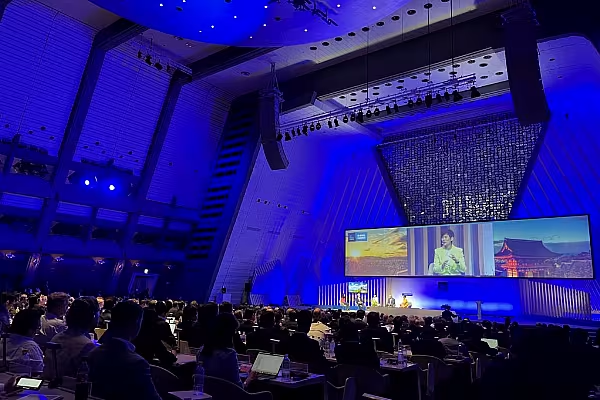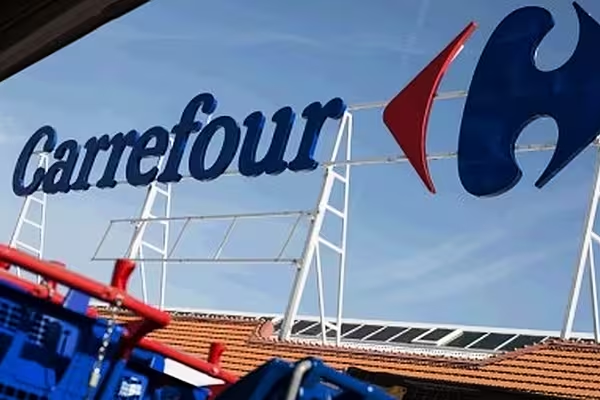The impact of generative AI, the challenge of balancing the needs of shoppers in multiple geographies, and the healing power of a good cup of tea were among the topics discussed on the first day of The Consumer Goods Forum Global Summit, which took place on 7 June in Kyoto, Japan.
Setting The Scene
Following an opening introduction from Fumio Kishida, Japan's Prime Minister, and Takatoshi Nishiwaki, governor, Kyoto Prefecture, the Summit got under way with a plenary session hosted by McKinsey's Sajal Kohli, who noted that we are now "living in a world of 'and's", where multiple consumer trends are intertwining at the same time.
For example, consumers are both trading down AND splurging selectively on particular items, demanding sustainability AND affordability, seeking familiarity AND exploring promiscuity – "the consumer has no middle ground" as Kohli noted.
The panel discussion that followed delved further into this notion, with Ian McLeod of Dairy Farm suggesting that consumers are "trading across" rather than trading down, and Jérôme Chouchan, CEO of Godiva adding that there is a real opportunity to create opportunities for shoppers to trade up, in a market where "the consumer is looking for experiences".
During the same discussion, Futerra's Solitaire Townsend noted that sustainability is embedded in that customer experience, and indeed, will be "a given for the rest of our careers and the rest of our consumers' lifetime".
Where companies dial down their sustainability messaging – which she dubbed "greenhushing" – this can have a negative effect equal to that of 'greenwashing', as the shopper feels that "something has been taken away" from the experience.
Local And Global
Next up, Walmart International CEO Judith McKenna offered her take on how the retail giant is applying different learnings around the world, such as China, India and Mexico, adding that as the group has intensified its focus on six target markets, the importance of finding the right talent comes to the fore.
"The more we work at it, the better we are getting at it," she explained.
Prior to the first networking break of the day, Nathalie Roos, CEO of Lipton Teas and Infusions took to the stage to explain how the newly-established business – spun out of Unilever last year – is working hard to build customer trust in a changing market. Trust, she observed, is "not a one company job", adding that transparency is a key value for forward-thinking businesses to aspire to.
"In a world that is informed and aware, we need to show things rather than just say them," she explained.
Implementing Change
Following the break, the newly-named co-chairs of The Consumer Goods Forum, Frans Muller, president and CEO of Ahold Delhaize, and Dirk Van de Put, chairman and CEO of Mondelēz International, joined former co-chairs James Quincey of Coca-Cola and Alibaba Group's Daniel Zhang – together with CGF managing director Wai-Chan Chan to discuss the Summit's theme this year, Pursuit of Harmony in Turmoil: Working Together to Make a Difference.
As Muller pointed out, recent successes in the CGF's Coalition of Action on Collaboration for Healthier Lives, particularly with regard to making affordable food available for those that need it most, is an illustration of the CGF's mantra, that "together, we are stronger". However, implementing future goals will require "courage" and "conviction", he added.
Muller and Van de Put were joined on stage by A.S. Watson CEO Malina Ngai and Bel Group CEO Cécile Beliot-Zind for a discussion panel, with Beliot-Zind extolling those present to "frame the right conversation" around driving positive change. "We need to make sure that everyone is engaged," she said. "If you are not informed and not aware, you will be unable to act."
Channel-Less Commerce
The afternoon featured a number of simultaneous sessions, hosted by Bain & Company; Capgemini and Nestlé; and SES-Imagotag. At the session ESM attended (Capgemini and Nestlé), the focus was on moving beyond traditional concepts of multichannel and omnichannel to a new way of thinking – channel-free commerce. Or, as the title of the discussion put it, 'Everything Everywhere All at Once'.
According to Capgemini's Owen McCabe, channel-less commerce will be as disruptive a force as "on-demand TV was for TV" – a retail environment in which the lines are permanently blurred. To succeed in this arena, brands will need to need to "go from focusing on winning the shelf, to winning customer lifetime value".
Nestlé's Neel Arora picked up on this, discussing how the consumer goods giant is seeking to capture unmet opportunities, taking partnerships (such as a recent tie-up with Delivery Hero), to the next level. "When we talk about 'everything everywhere all at once', it's not a strategy, it's a consumer need," he explained.
This was followed by a series of parallel impact sessions on topics including people-centred partnerships; Japanese food culture; and circularity on food packaging.
At the latter session, Bertrand Swiderski, chief sustainability officer, Carrefour, noted that for sustainable packaging to work, it needs to "create value" for the consumer, while Amcor's David Clark added that there is now "no excuse" for consumer goods firms to unveil new products with unsustainable packaging, given that the technology is available to choose a different approach.
Elsewhere, a separate session saw Marjan de Bock-Smit, co-CEO of Impact Buying and Bram van Schijndel Tromp, founder and CEO of PureValue, join the CGF's Rudy Hagedorn in an analysis of how transparency and data disclosure can assist with sustainability and compliancy performance.
Generative AI
Given that so much discussion on day one focused on the role that technology can play in furthering the retail agenda, the final plenary session of the day was always likely to garner interest, as Miki Tsusaka, president of Microsoft Japan, Coca-Cola CEO James Quincey and John Ross of IGA discussed the topic of 'Generative AI – What is the Business Case for Industry?'
As Quincey observed, while there is little doubt that AI "will change the relationship [we have] with consumers" over the coming years, there is still little visibility as to what shape this will take. For example, as he pointed out, generative AI could dramatically reduce the cost of advertising, and enable a more tailored marketing approach, but at the same time, as costs do down, the market could be flooded, thereby promoting a return to a more store-based strategy.
"It's important that the executives that launch these things out there have a degree of understanding of the fundamentals of what we are doing," he explained.
Elsewhere, Microsoft's Tsusaka said that she was hopeful that generative AI can play a role in "enabling" business transformation, but added that those seeking to take the digital plunge "need to have a roadmap" as to what they hope to achieve.
Following a busy day of insight and discussion, it was high time for an evening's entertainment, courtesy of the annual L'Oréal party.
Roll on day two!
Read More: The Consumer Goods Forum Names Ahold Delhaize And Mondelēz International CEOs As New Co-Chairs
© 2023 European Supermarket Magazine – your source for the latest retail news. Article by Stephen Wynne-Jones. Click subscribe to sign up to ESM: European Supermarket Magazine.














